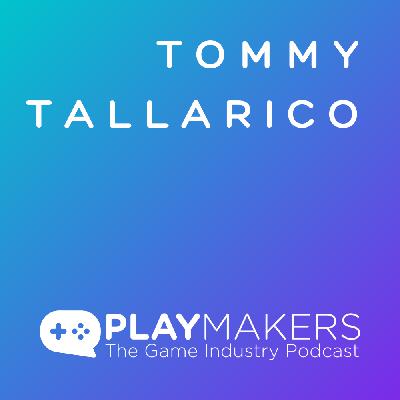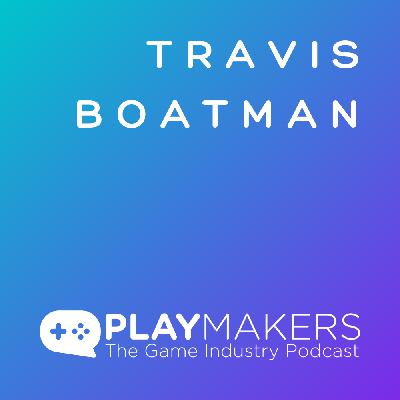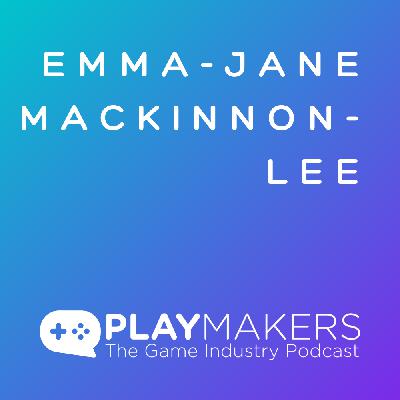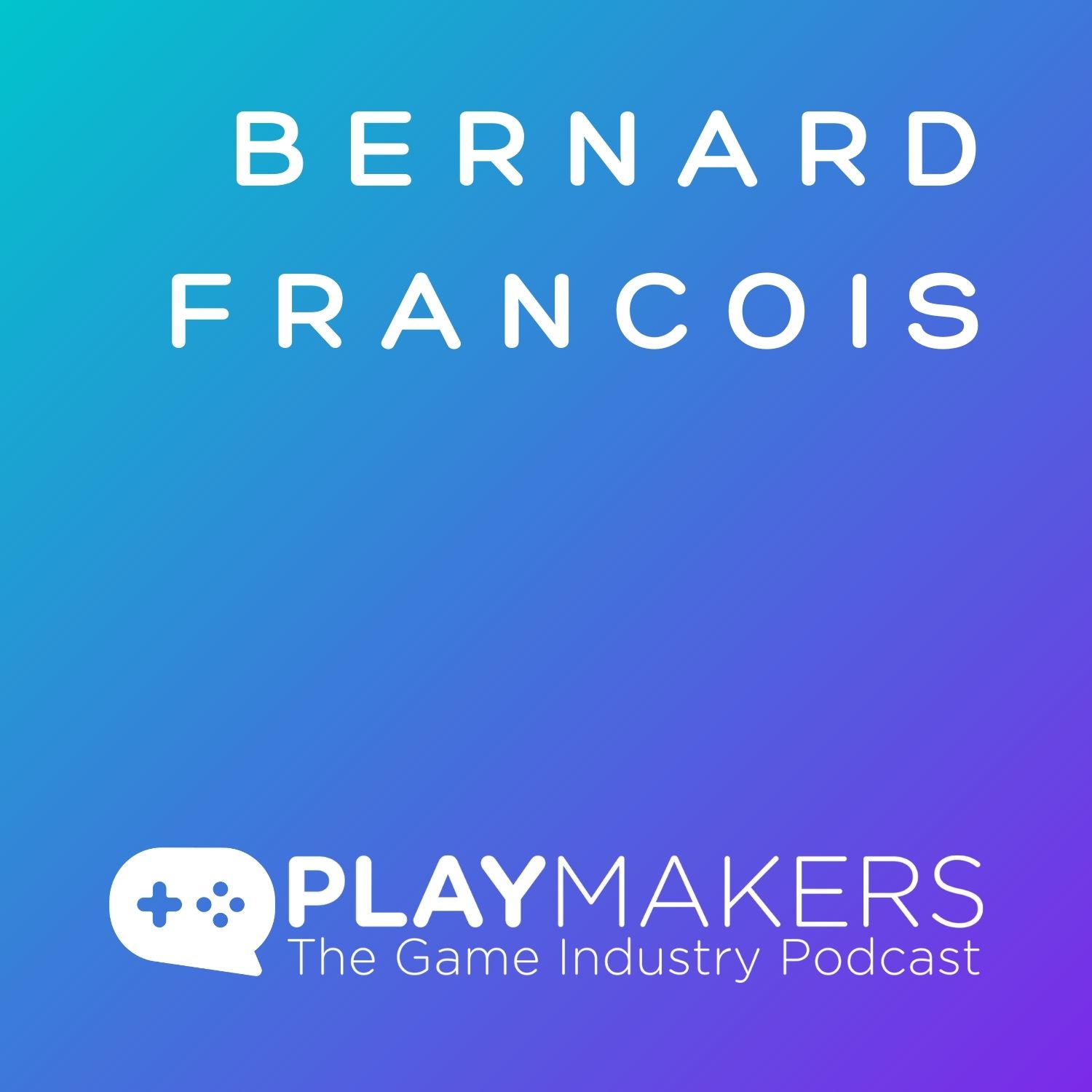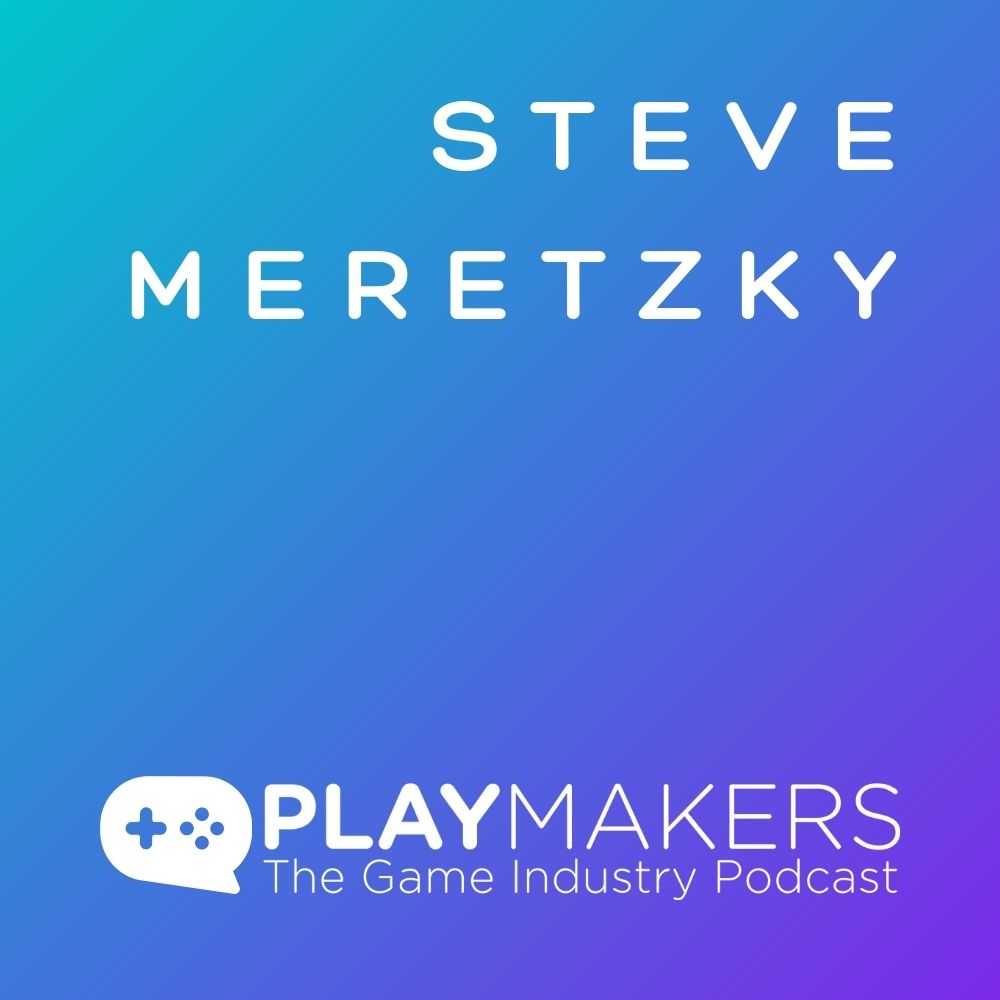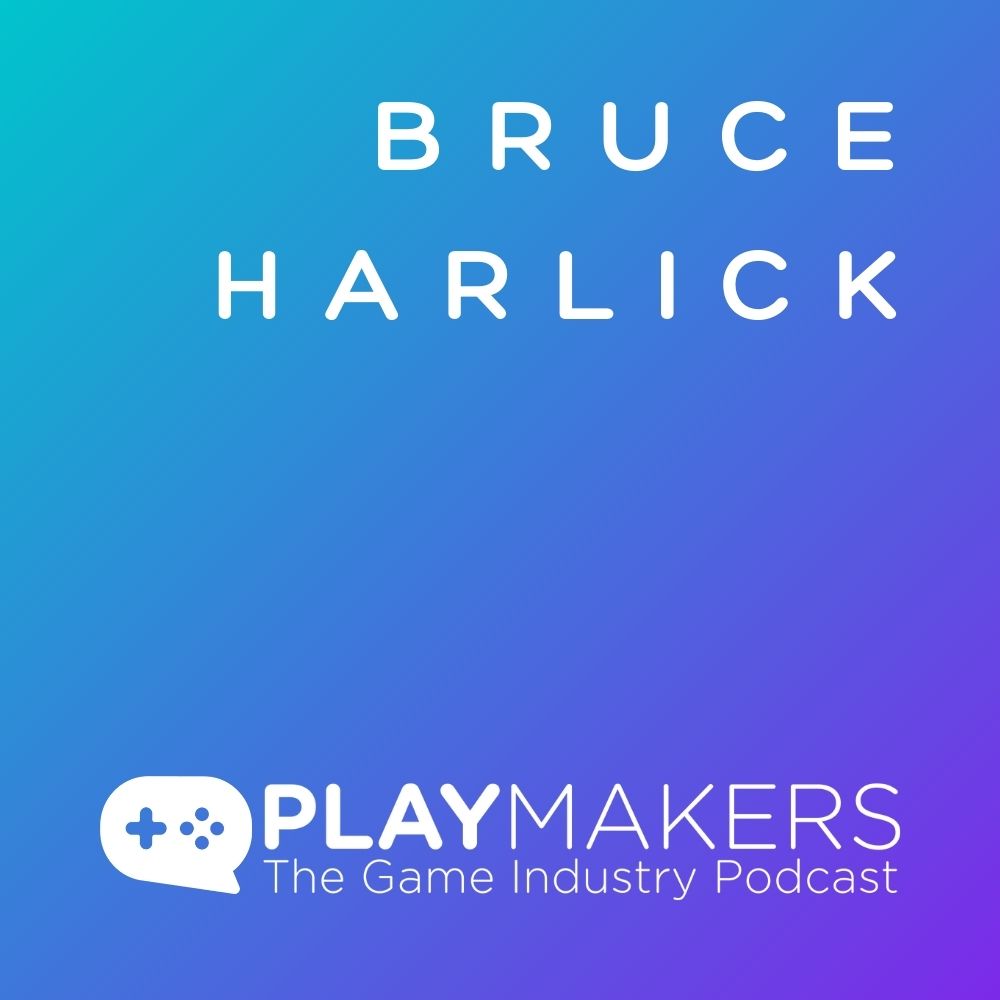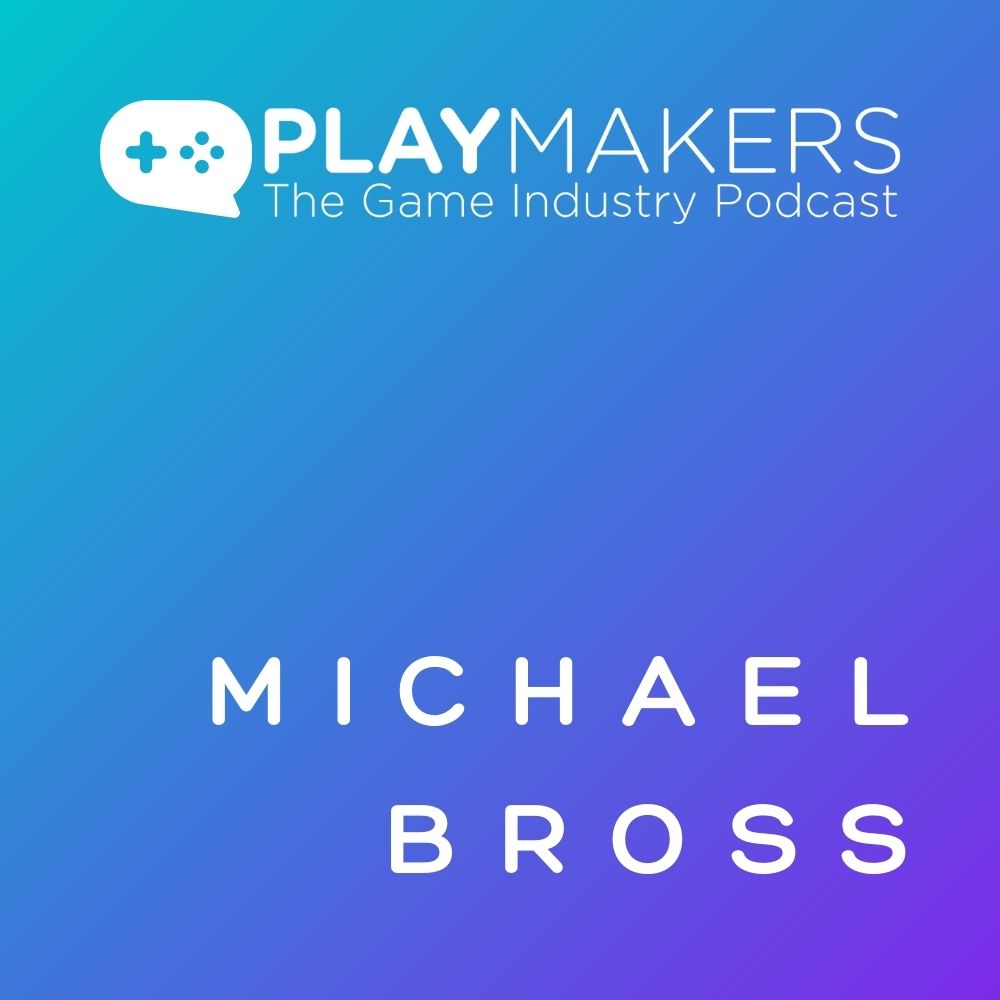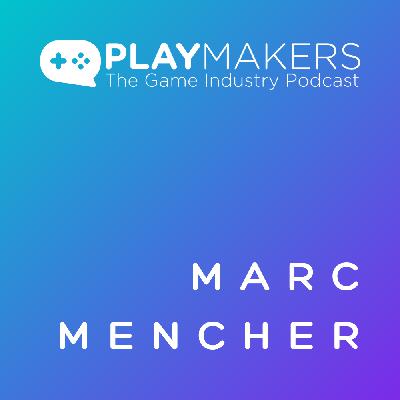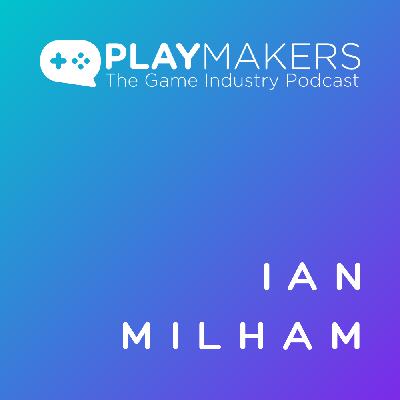Discover Playmakers - The Game Industry Podcast
Playmakers - The Game Industry Podcast

Playmakers - The Game Industry Podcast
Author: Jordan Blackman
Subscribed: 42Played: 427Subscribe
Share
© Copyright 2021 Bright Black Associates
Description
Jordan Blackman interviews the leaders and legends of the video game industry so that you can succeed with your game project, career, or venture. Discover how you can produce, market, and operate games more successfully so that your career can be more satisfying and impactful, whether you're a game designer, engineer, or entrepreneur and whether you work at a studio, publisher, brand or startup. Jordan is an industry insider, who has worked as a Senior Producer at Ubisoft and a Lead Designer at Zynga. Since 2012, Jordan has been helping clients like EA Sports, AMC Networks, The Pokemon Company, Ellen Degeneres, and Capcom create and grow hit games. In each episode of Playmakers, he goes to work uncovering valuable insights, tactics, and know-how from a wide range of entertaining personalities including designers, writers, product managers, technologists, studio founders, executives, and more. Why? So that you get practical perspectives and insights week after week. No matter your experience or discipline, this is the show that can level you up on everything from raising funds to live operations, and everything in-between. Oh, and you'll have fun every step of the way, because there's a magic sprinkle of goofiness in each episode. So thwack that subscribe button and buckle your safety belt, 'cus this here is the wildest ride in the metaverse.
34 Episodes
Reverse
In this episode:Jordan sits down with legendary video game composer, producer, and entrepreneur Tommy Tallarico, whose career spans over 30 years in the gaming industry. Known for his work on iconic titles like Prince of Persia, Earthworm Jim, and MDK, Tommy shares his inspiring journey from homelessness to launching major projects such as Video Games Live and the new Intellivision Amico console. This episode dives deep into Tommy’s mindset for success, offering advice on goal-setting, perseverance, and the importance of networking. Tommy also discusses his approach to creating successful video games and his passion for bringing back family-friendly gaming experiences.Topics covered:How Tommy broke into the video game industryHis journey working on iconic games like Prince of Persia and Earthworm JimTommy’s vision for the Intellivision Amico and how it aims to bring back family gamingInsights into building successful development teams and working with indie developersThe future of video games post-pandemic and the impact of remote work on creativityFor more game industry tips:Learn more about Jordan & Bright BlackListen on iTunes | Spotify (Support the show and leave a review)Visit www.playmakerspodcast.com for the full blog post and more!Episode Timestamps:[01:43] Tommy's early career journey: from game tester to game audio[06:30] First big break with Prince of Persia and redefining sound design in games[10:15] Tommy’s mindset on success[13:10] Goal-setting and climbing metaphorical mountains in your career[17:10] Networking and why selling yourself is key to success[20:00] The importance of passion and genuine connection with others[24:10] Intellivision Amico and the return of couch co-op gaming[32:15] How Amico offers a unique digital board game experience[36:00] Working with indie developers and offering personalized development support[40:50] The impact of COVID-19 on game development and team collaboration[44:20] Tommy’s final thoughts on on success and his future projectsResources & media mentioned in this episode:Connect with Tommy on LinkedInCheck out more of Tommy’s workMeet Amico!Connect with Tommy on InstagramWatch "The Secret" DocumentaryThe Secret (Book byRhonda Byrne)
In this episode:Jordan sits down with Amy Jo Kim, a game designer, community architect, and innovation coach, named by Fortune as one of the “Top 10 Influential Women in Games.” Amy Jo has contributed to hit games like The Sims, Rock Band, Ultima Online, and Covet Fashion, and has worked on non-gaming products such as eBay, Netflix, and NYTimes.com. She is also the author of “Community Building on the Web” (2000) and “Game Thinking” (2018).Amy Jo dives deep into her concept of “Superfans” and explains why they are critical to achieving market success. She discusses her approach to creating innovative products, how to find superfans early, and how this methodology can scale projects to achieve global success.Topics covered:What are “Super Fans” and why they are critical to getting a “beachhead” in the marketWhy the “Fast Follow” method limits growth potentialHow to quickly find and engage with Superfans to grow your productHow to create innovative projects that scale in a BIG way Amy Jo’s Superfan Challenge: A free challenge designed to help teams identify their superfansFor more game industry tips:Learn more about Jordan & Bright BlackListen on iTunes | Spotify (Support the show and leave a review)Visit www.playmakerspodcast.com for the full blog post and more!Episode Timestamps:02:58 Introduction to Amy Jo Kim and her journey in the gaming industry06:26 Combining game design with innovation across industries07:44 The power of Superfans: engaging early adopters to drive product success12:12 Avoiding the “Fast Follow” strategy: learning from copycat games16:14 Testing your core game loop with superfans and early adopters20:07 The role of Superfans in evolving game design22:06 Why tuning the core loop is essential for success25:38 The connection between the core loop and player journey28:22 Using Superfan techniques to build a community34:43 Identifying superfans in casual games 38:31 Join Amy Jo Kim’s Superfan ChallengeResources & media mentioned in this episode:Connect with Amy Jo Kim:Amy Jo on LinkedInAmy Jo on TwitterTake Amy Jo’s FREE challenge: Superfan ChallengeCheck out Game Thinking: GameThinking.ioAmy Jo's Podcast: Getting2AlphaBooks by Amy Jo Kim:Game Thinking: Innovate Smarter &...
In this episode:Jordan sits down with Jon Radoff, the founder of Beamable,the creator-centric platform for building live games in Unity. Jon's career spans across multiple areas of the game industry, from building one of the first commercial internet games to leading the development of popular mobile games like Game of Thrones Ascent and Star Trek Timelines. Jon shares his insights on building successful games by taking multiple "shots on goal," balancing creativity with data, and understanding when to pivot or push forward with a project. He also dives into the future of the metaverse and how it could impact game development.Topics covered:Jon’s entrepreneurial journey and how Beamable evolved into what it is todayKey tips and techniques for getting your game off the groundThe balance between iterating on a game and deciding when to move on to a new projectWhy you should get user feedback before you even have a playable version of your gameHow to know when it’s time to throw in the towel on a projectThe future of the metaverse and how creators will shape itFor more game industry tips:Learn more about Jordan & Bright BlackListen on iTunes | Spotify (Support the show and leave a review)Visit www.playmakerspodcast.com for the full blog post and more!Episode Timestamps:[03:16] Jon’s start in games: creating one of the first commercial games on the internet[08:26] Moving into mobile games and the creation of Game of Thrones Ascent[10:15] How to balance creativity and data in game development[13:00] The importance of taking "shots on goal" in game design and business strategy[17:53] When to start testing and gathering feedback on game ideas[20:05] Building an audience and gathering feedback before having a playable game[25:22] Lessons learned from Star Trek Timelines and using real-time data from players[28:30] Managing risk and deciding when to stop working on a game[31:45] Balancing iteration time versus moving on to a new project[35:03] Creativity in game development versus pure data-driven design[38:25] The future of game creation and Beamable’s vision[44:43] Jon’s thoughts on the metaverseResources & media mentioned in this episode:Connect with Jon:Jon on LinkedInJon on TwitterJon’s BlogCheck out Beamable:li...
In this episode:Jordan interviews Joakim Achrén, a gaming entrepreneur with over 15 years of experience. Joakim shares his journey from co-founding two venture-backed gaming startups, including Next Games (which IPOed in 2017), to his current role at Elite Game Developers. Joakim helps aspiring game entrepreneurs launch their own studios and is also an angel investor in companies like Skunkworks Games, Lightheart Entertainment, and Savage Game Studios. He also provides deep insights into how mobile game entrepreneurs can navigate the challenges of game development, from early validation to scaling successful games.Topics covered:How Joakim caught “the bug” for helping other foundersWhat comes between the early validation phase and obtaining data from user behavior within a playable version of your gameThe most common trap mobile developers fall into The biggest takeaways you should be gaining from your metricsThe key to building mobile games that make players want to come backThe balance between “stealing like an artist” and innovating What the gaming industry can learn from Pixar’s creative process For more game industry tips:Learn more about Jordan & Bright BlackListen on iTunes | Spotify (Support the show and leave a review)Visit www.playmakerspodcast.com for the full blog post and more!Episode Timestamps:[03:31] Joakim's early career and his journey into game development[06:52] Starting Next Games and working with AMC on The Walking Dead[09:48] The "bug" that inspired Joakim to help game founders[12:11] Biggest mistakes mobile game developers make[14:56] Joakim's view on Game Pass and the evolution of free-to-play models on PC and console[17:35] Understanding the gap between early validation and real user data[22:06] The common pitfalls in mobile game concepting and iteration[27:57] The balance between innovation and "stealing like an artist"[31:45] Building an audience-first approach in game development[36:15] Pixar’s "Brain Trust" model and how it applies to game studios[40:36] The impact of COVID-19 on the game industry and the rise of social gaming[44:20] Joakim’s thoughts on the future of mobile gaming and game developmentResources & media mentioned in this episode:Connect with Joakim Achrén:Joakim on LinkedInJoakim on TwitterJoakim’s BlogLearn more about Elite Game Developers:Elite Game Developers WebsiteBooks mentioned:Creativity, Inc.
In this episode:Jordan sits down with Tadhg Kelly, an experienced consultant specializing in augmented reality (AR), virtual reality (VR), and video games, with a rich background in game design and production. Tadhg has held significant roles at notable companies like BSkyB, Lionhead Studios, Climax Studios, and Mobile Game Doctor. His work spans a variety of game projects, from board games and live-action role-playing games to large-scale PC games and innovative AR/VR technologies. In this episode, Tadhg shares his journey from game designer to consultant, offering invaluable insights into the industry's evolution and the lessons he has learned along the way.Topics covered:Tadhg’s transition from game designer to consultant and the lessons he learned along the wayUnderstanding the "Sexy/Worthy Trap" and how to use it to your advantage in game designBalancing speed-to-market against feature development in game projectsThe benefit of having diverse skill sets in the gaming industryCommon mistakes made in the early stages of game developmentThe value of letting your game developer do their jobFor more game industry tips:Learn more about Jordan & Bright BlackListen on iTunes | Spotify (Support the show and leave a review)Visit www.playmakerspodcast.com for the full blog post and more!Timestamps:[03:04] Tadhg’s journey from game designer to consultant[06:15] Lessons learned from working on various game projects[09:47] Examples of “cliff projects” and challenges in game development[13:00] Consulting and transitioning from traditional game development[17:19] The “Sexy / Worthy Trap” and how it influences successful games[22:27] Simple mistakes in the early stages of game development[24:06] Why assumptions about gameplay and player psychology can lead to failure[26:57] The importance of being “sexy” rather than “worthy” in game development[30:09] Writing game design documentation and focusing on the user experience[36:30] Lessons from working on platforms like OUYA and Magic Leap[44:43] Tadhg’s thoughts on consulting and what’s next in the game industryResources & media mentioned in this episode:Connect with Tadhg:LinkedInWork with Tadhg at Mobile Game DoctorRead the What Games Are Bloga...
In this episode:Jordan interviews Travis Boatman, CEO and co-founder of Carbonated, a mobile game studio based in LA. Travis is a 25-year veteran of the game industry, with over 20 years of experience in mobile games. He has previously served as SVP of Mobile at Zynga and Electronic Arts (EA), where he led global studios and mobile game strategy. Travis discusses his entrepreneurial journey, the pillars of a successful studio, and his approach to building games in a rapidly evolving market.Topics covered:Travis’s journey from producer to Senior VP and eventually founding his own studioThe three essential pillars of the game industryHow to follow customer feedback toward successHow the game industry is similar to stand up comedyThe importance of embracing new technologies continuouslyWhat sets successful LiveOps games apart from othersFor more game industry tips:Learn more about Jordan & Bright BlackListen on iTunes | Spotify (Support the show and leave a review)Visit www.playmakerspodcast.com for the full blog post and more!Timestamps:[03:02] Travis’ journey from game producer to running Carbonated[06:15] The three pillars of the game industry[10:42] How technology drives game mechanics and innovation[13:38] Why staying updated on technology trends is crucial for long-term success[15:18] Starting Carbonated and the role of a strong technical co-founder[24:39] The impact of mobile on high-quality games like Call of Duty and Fortnite[27:27] Strategies for building a two-product studio and managing team morale[33:38] Understanding player feedback through platforms like Reddit and Discord[37:00] Why trying to appeal to everyone in game design often leads to failure[38:35] Travis’ thoughts on keeping focus in game developmentResources & media mentioned in this episode:Connect with Travis Boatman:LinkedInTwitterLearn more about Carbonated:WebsiteTwitterDiscorda...
In this episode:Jordan sits down with Nick Fortugno, an entrepreneur, game designer, and interactive narrative expert. Nick is the co-founder and Chief Creative Officer at Playmatics, a company known for creating innovative digital and real-world experiences for top organizations like Pro Publica, Red Bull, AMC (including the CableFAX award-winning Breaking Bad: The Interrogation), Disney, the American Museum of Natural History, and more. Nick also teaches at Parsons School of Design, where he's helped shape their game design curriculum.Topics covered:Nick’s journey from intern to Founder and Chief Creative Officer at PlaymaticsKey lessons on keeping a game studio afloat and competitive in a crowded marketThe game-changing principles of game design he’s picked up over the course of his career“Failing up” in game design: how mistakes fuel innovationThe MDA framework (Mechanics, Dynamics, Aesthetics) as an approach to game design and how he utilizes this techniqueWhat Nick looks for when hiring game designers and producers: what’s taught in school vs. what needs to be cultivatedThe role of artificial intelligence in the future of gaming technologyFor more game industry tips:Learn more about Jordan & Bright BlackListen on iTunes | Spotify (Support the show and leave a review)Visit www.playmakerspodcast.com for the full blog post and more!Episode Timestamps:[03:29] Nick’s early career and transition into game design[06:35] The foundation and evolution of Playmatics[08:02] The two key lessons that helped Playmatics survive and thrive[11:36] Innovative game design approach at Playmatics[16:09] How game genres evolve and how designers can think beyond genre constraints[19:40] The value of early prototypes and using failure to innovate[21:00] Using MDA as a approach to game design[24:29] What Nick looks for when hiring game designers and producers[28:56] The role of AI and machine learning in future game development[34:25] How social gaming has grown during the pandemicResources & media mentioned in this episode:Connect with Nick Fortugno:LinkedInTwitterLearn more about Playmatics:WebsiteCheck out the a...
In this episode:Jordan interviews Emma-Jane MacKinnon-Lee, a dynamic innovator at the intersection of gaming, web3, and digital fashion. Emma-Jane is the founder of DIGITALAX, the pioneer digital fashion NFT protocol and marketplace for gaming and esports. In this episode, she discusses how web3 technologies like NFTs, cryptocurrency, and decentralization are transforming the gaming industry. Emma-Jane dives deep into the metaverse and discusses how the game industry stands to be disrupted during the rise of ”web3” technologies that enable digital scarcity, decentralization, and interoperability. Topics covered:Emma-Jane’s journey from space engineering to founding DIGITALAXThe intersection of gaming, fashion, and NFTs in web3The challenges of interoperability in digital fashion and gamingHow NFTs and cryptocurrency bring value to in-game assetsThe potential of web3 to create sustainable careers for indie game developersAdvice for game developers looking to enter the NFT spaceFor more game industry tips:Learn more about Jordan & Bright BlackListen on iTunes | Spotify (Support the show and leave a review)Visit www.playmakerspodcast.com for the full blog post and more!Timestamps:[03:15] Emma-Jane's journey from space engineering to gaming and NFTs[06:28] What DIGITALAX is and how it relates to the game industry[09:05] What Ethereum is and its relevance to gaming and NFTs[11:50] Layer two solutions: Making Ethereum scalable and sustainable[14:24] The rise of the metaverse and its impact on digital economies[16:58] How NFTs create interoperability and value across different digital ecosystems[22:04] Challenges of interoperability between different games and environments[24:27] How decentralized value systems (NFTs and blockchain) empower game developers[30:29] The importance of programmable incentives in building gaming ecosystems[33:23] The role of mod culture in gaming and digital fashion[44:04] Emma-Jane’s advice for developers entering the NFT spaceResources & media mentioned in this episode:Connect with Emma-Jane MacKinnon-Lee:TwitterLearn more about DIGITALAX:DIGITALAXDiscordGames & companies...
In this episode:Jordan sits down with Colm Larkin, a programmer, game designer, and board game enthusiast. He is the founder of Gambrinous and creator of indie hits Guild of Dungeoneering and Cardpocalypse. Colm has recently been appointed as Chief Executive Officer (CEO) at IMIRT, the Irish Game Makers Association. In this interview, Colm shares his inspiring journey from part-time game developer to full-time studio owner and discusses the lessons learned along the way.Topics covered:Colm’s transition from part-time to full-time game developmentThe importance of conquering perfectionism when building your gameWhat helped Colm the most in getting his first game off the groundHow to know when it’s time to start expanding your team as an indie developerTo animate or not to animate? The impacts of art on your creation processHow to set yourself up for success when it comes to seeking out a publisher For more game industry tips:Learn more about Jordan & Bright BlackListen on iTunes | Spotify (Support the show and leave a review)Visit www.playmakerspodcast.com for the full blog post and more!Timestamps:[04:51] Colm’s journey from part-time game dev to full-time studio owner[06:18] The "One Game a Month" challenge and the early development of Guild of Dungeoneering[10:41] Overcoming perfectionism and finishing projects[17:15] How Colm knew it was time to expand the team19:04 Managing time and being productive as an indie developer20:47 Partnering with an artist and how it transformed Guild of Dungeoneering[22:59] How unique art styles can help indie games stand out[28:02] Early marketing strategies and pre-order success[30:06] Advice on working with publishers and finding the right fit[34:48] Colm’s thoughts on oversharing and working on a “secret” projectResources & media mentioned in this episode:Connect with Colm Larkin:LinkedInTwitterLearn more about Gambrinous:WebsiteCheck out the announcement of Colm’s Secret Project!Watch Colm’s talk:
Playmakers is back with a brand new season by and for game industry professionals. We're bringing you actionable insights you can use to grow in your career, make better games, and improve your game industry business. The pandemic has been called "The Great Accelerator" and it's important to stay on top of where the industry is going. That's why we're bringing you an amazing variety of game industry leaders and legends to light the way. Be sure to subscribe to the podcast wherever you love to listen and head to www.playmakerspodcast.com to check out even more resources and episodes. We're really proud and excited to show you what we've been cooking up. Game on.
In this episode:Jordan sits down with Chris Ferriter, an award-winning Producer and Designer. Chris’s career began in 1994, spanning both the motion picture and video game industries. He transitioned to the gaming industry in 1998 and has since produced over 50 games for top publishers like THQ, Midway, Ubisoft, and EA Sports. He is currently the President of Halon Entertainment, a visualization, virtual production, and game cinematics studio. Halon has collaborated with blockbuster films like Star Wars, Avatar, and The Mandalorian, as well as game cinematics for XCOM 2, God of War, Fortnite, and more. Listen in as Chris shares insights on how game engine technology is transforming storytelling and production across industries.Topics covered:Chris’s journey from film to games and back to virtual productionBreaking into the industry: getting a degree vs. getting your foot in the doorHow to tell the best possible story with transmedia storytellingThe importance of previs (previsualization) in storytelling and productionBehind-the-scenes of game development and cinematicsThe COVID-accelerated normalization of virtual production workflowsFor more game industry tips:Learn more about Jordan & Bright BlackListen on iTunes | Spotify (Support the show and leave a review)Visit www.playmakerspodcast.com for the full blog post and more!Episode Timestamps:[04:48] Chris’s start in the industry and how his background in film influenced his career in games[06:50] Early experience with optical and digital visual effects[08:06] Transition to games and joining THQ as a game tester[10:27] Breaking into the industry: the role of a degree vs. getting your foot in the door[14:09] Halon Entertainment's role in both game and film production[16:06] Behind the scenes of big-budget cinematics[22:42] How small developers can bring cinematic techniques into their games[28:56] Virtual production workflow and its benefits[34:24] Virtual production’s impact on the industry during COVID-19[37:44] Virtual environments and LED stage technology in storytelling44:58 Chris’s thoughts and advice on storytelling across mediumsResources & media mentioned in this episode:Connect with Chris Ferriter:LinkedInTwitterLearn more about Halon Entertainment:a...
In this episode:Jordan sits down with Jay Powell, the founder of The Powell Group, a video game consulting firm specializing in business development, publishing support, and licensing. Jay has over 20 years of experience in the games industry, working with companies like Other Ocean, Spill Games, and Deep Silver. He also leads the Indie Game Business Initiative, which produces a weekly podcast and virtual business conferences to help indie developers understand the business and marketing side of game development. Jay shares his insights on how indie developers can strategize their approach to publishers, avoid common business mistakes, and navigate the publishing landscape in a post-pandemic world.Topics covered:How to strategize your approach to publishers as an indie developerAvoiding common business mistakes made by small studiosCurrent opportunities in the game development market for indie devsThe impact of the pandemic on publishing for indie and small teamsThe role of platforms like Microsoft Game Pass in today’s distribution landscapeFor more game industry tips:Learn more about Jordan & Bright BlackListen on iTunes | Spotify (Support the show and leave a review)Visit www.playmakerspodcast.com for the full blog post and more!Timestamps:[03:28] Jay’s career journey and how he started The Powell Group[06:15] The biggest mistakes indie developers make when approaching publishers[10:48] Understanding the publishing landscape and your options[14:00] How to prioritize your pitch to publishers[18:10] The role of playable demos in pitching your game[22:36] The impact of COVID-19 on indie game development and publishing[27:50] Opportunities in the market for indie developers[32:06] The role of platforms like Microsoft Game Pass in indie game distribution[35:40] Jay’s advice for indie developers Resources & media mentioned in this episode:Connect with Jay Powell:LinkedInTwitterLearn more about The Powell Group and Indie Games Business:The Powell Group Check out The Indie Game Business Podcasta...
In this episode:Jordan interviews Bernard François, founder of Preview Labs, a company that specializes in rapid prototyping for video games. They have created prototypes for Amazon, Wargaming, Unity, Disney Imagineering, Google R&D, and more. Bernard shares expert insights into the world of prototyping, offering practical advice on how to build prototypes that are efficient, effective, and serve as a foundation for innovative game development.Topics covered:Bernard’s journey from programmer to founding Preview LabsThe key differences between prototypes, MVPs, vertical slices, and grey boxingThe difference between internal prototypes and prototypes for a pitchHow to set up an effective prototype and key variables to considerCommon prototyping mistakes and how to avoid themThe importance of functional graphics in prototypesKnowing when to stop the prototyping process and move forward with productionFor more game industry tips:Learn more about Jordan & Bright BlackListen on iTunes | Spotify (Support the show and leave a review)Visit www.playmakerspodcast.com for the full blog post and more!Timestamps:[02:53] Bernard’s background and how Preview Labs began[04:11] Bernard’s journey to becoming a prototyping expert[06:53] The formation of Preview Labs and its early success[09:44] Defining a prototype’s vision and key mechanics[11:58] The importance of keeping prototypes simple[13:21] Prototyping for pitches versus internal prototyping[17:35] Feature creep and the importance of scope[19:53] How to make use of variables and iterations in prototypes[23:03] The value of functional graphics over grey boxing[28:52] When to stop prototyping and move into production[34:20] Common pitfalls in prototyping and how to avoid themResources & media mentioned in this episode:Connect with Bernard François:LinkedInTwitterLearn more about Preview Labs:WebsiteFacebook
In this episode:Jordan interviews the legendary Steve Meretzky, a game designer and producer, best known for creating Infocom games. Steve was recognized as one of PC Gamer’s “Game Gods” and is renowned for his work on beloved text adventures like Zork, Planetfall, and Leather Goddesses of Phobos. He’s also held senior creative roles at companies such as King, GSN, and Disney/Playdom. Steve shares wisdom from his long career in the gaming industry, covering everything from IP development, narrative and character design, puzzle creation, and more.Topics covered:Steve's career journey and early days at InfocomHow to identify if a game project is on track for greatnessModerating creative ambition to manage team resourcesThe story behind the creation of Leather Goddesses of PhobosWhat should come first, the story or the puzzles in an adventure game?Choosing the right IP for a game projectSteve's thoughts on game writing and character developmentA valuable story about the dangers of not leveraging successes when you have themFor more game industry tips:Learn more about Jordan & Bright BlackListen on iTunes | Spotify (Support the show and leave a review)Visit www.playmakerspodcast.com for the full blog post and more!Timestamps:[03:16] Steve’s entry into the game industry and Infocom[07:05] Writing and designing Planetfall[10:23] How Planetfall made players cry[12:30] Identifying a successful game in development[15:25] Technology challenges and risks: The Unity and Facebook project[17:14] Balancing creative ambition and resource management[21:00] Game writing and storytelling: Challenges in nonlinear mediums[23:12] Her Story and innovative game storytelling[26:00] Puzzle design in text adventures[28:44] IP development: The story behind Leather Goddesses of Phobos[35:25] Leveraging IP and sequels: Mobsters and Gardens of Time[40:28] Steve’s approach to working with existing IPResources & media mentioned in this episode:Connect with Steve Meretzky:LinkedInGames & companies mentioned:InfocomPlaydomDisney InteractiveGSNKingPlanetfall...
In this episode:Jordan sits down with Bruce Harlick, a seasoned game designer who primarily worked on role-playing games. Bruce has worked with some of the industry's biggest names, including Zynga, LucasArts, NCSoft, and Hangar 13, and is now Systems Design Director at Ripple Effect Studios. He shares deep insights into game design, live ops, and the creative challenges of balancing business demands with game development.Topics covered:How to determine the right amount of content to launch withDesigning games to avoid a never-ending content treadmill for your teamThe benefits of live ops for creativity in comparison to launching new gamesHow to design effective content toolsThe impact of tech and procedural debt on a game’s futureBalancing between retention and revenue in LiveOps gamesHow to put together a quarterly calendar of content releases in a way that balances the key KPIHow to balance out risky new features with reliable featuresThe importance of working closely with the game’s community to design content players loveWhy passion and empathy are critical to successful game designFor more game industry tips:Learn more about Jordan & Bright BlackListen on iTunes | Spotify (Support the show and leave a review)Visit www.playmakerspodcast.com for the full blog post and more!Timestamps:[03:04] Bruce’s journey from tabletop games to live ops[06:15] Lessons from managing content on tabletop role-playing games like Champions[10:12] Transition from physical to digital games, and joining Monolith to work on The Matrix Online[13:00] Learning from The Matrix Online and the rise of live game operations[17:14] The importance of designing for live operations early on[21:00] How live games differ from launching a one-time game product[25:32] Creating evergreen systems and scalable content for live games[28:52] Managing tech debt and the challenges of balancing performance with content expansion[32:33] The value of collaborating with your community for live content[36:15] Designing a quarterly calendar for content updates[40:52] Balancing creativity and risk in game updates[44:43] Bruce’s thoughts on live ops and creating long-lasting gamesResources & media mentioned in this episode:Connect with Bruce Harlick:LinkedIna...
In this episode:Jordan interviews Gordon Rowe, a seasoned product manager with extensive experience in monetization strategies and product management within the gaming industry. Gordon has worked at Zynga, where he managed Mafia Wars and was the sole product manager on Zynga’s 3rd party publishing team. He later joined Daybreak Games and now works at Facebook. In this episode, Gordon shares his expertise on free-to-play (F2P) game economies, player retention, and balancing revenue generation with player satisfaction.Topics covered:The hypothesis, test, iterate framework for improving key performance indicators (KPI)Using funnels to understand player behaviorAnti-cheat considerations in competitive mobile gamesZynga monetization tricks and managing in-game currency “hangovers”Avoiding "pay-to-win" dynamics in free-to-play games and why League of Legends has elements of itBalancing retention and revenue in game designHow to evaluate F2P games using Day 1 (D1) and Day 7 (D7) retention metricsBuilding a balanced game economy and when to introduce monetization into the player journeyThe maturation of the mobile and PC F2P marketsFor more game industry tips:Learn more about Jordan & Bright BlackListen on iTunes | Spotify (Support the show and leave a review)Visit www.playmakerspodcast.com for the full blog post and more!Timestamps:[03:16] Gordon’s journey from Mafia Wars to Daybreak Games and Facebook[07:05] Product management and the hypothesis-test-iterate framework[10:12] Anti-cheat measures and team structures at Zynga[13:00] Monetization strategies and avoiding pay-to-win[17:14] The importance of actionable analytics in game development[21:00] Managing game economies to avoid “currency hangovers”[26:00] Day 1 and Day 7 retention metrics: What they tell you about your game[28:56] Monetization strategies in League of Legends and World of Tanks[34:24] How to test and iterate for better monetization in F2P[40:52] The role of Steam reviews and player feedback in PC game success[44:43] Gordon’s thoughts on product management and monetization strategiesResources & media mentioned in this episode:Games & companies mentioned:Mafia Wars (Zynga)Daybreak GamesFacebookSteam Spy (Analytics tool)League of Legends (Riot Games)Rocket League...
In this episode:Jordan interviews AAA audio composer and sound designer Michael Bross, known for his work on games like Ratchet & Clank, Counter Strike, Oddworld, XCOM 2, Simpsons: Tapped Out, World of Tanks, Arena of Valor, and more. Michael shares insights on breaking into the game industry as a composer, what he looks for when hiring new talent, and when audio teams should be brought into the game development process. He also shares the importance of early audio integration in game development, his unique approach to concept composition, and how to get the best out of working with audio teams.Topics covered:Michael’s journey into the game industry and breaking into audio for AAA gamesWhat Michael looks for when hiring new composers and sound designersHow early in the process to involve audio in game developmentThe role of audio in live service games (LiveOps) and how it has changedThe value of concept composition and creating music early in the design processTips for producers and developers to get the most from their audio teamsHow LiveOps have changed the way audio is integrated into gamesFor more game industry tips:Learn more about Jordan & Bright BlackListen on iTunes | Spotify (Support the show and leave a review)Visit www.playmakerspodcast.com for the full blog post and more!Timestamps:[02:53] Michael’s early career: From songwriter to game composer at Paragon Software[06:18] The transition from small studios to AAA titles like Ratchet and Clank[09:44] What Michael looks for in new composers and sound designers[12:12] Concept composition: Creating music early to set the tone for game development[16:15] Working with non-musical teams: How to give emotional direction to composers[19:53] Balancing cinematic scores with gameplay[23:03] How live operations (LiveOps) have changed the audio development process[28:52] Challenges in VR audio development, including Edge of Nowhere[34:20] Michael’s thoughts on audio’s role in evolving game genres and technologiesResources & media mentioned in this episode:Learn more about Michael Bross:LinkedInTwitterFacebookGames & companies mentioned:Ratchet & Clank (Insomniac...
In this episode:Jordan interviews Marc Mencher, a seasoned game industry recruiter and CEO of GameRecruiter. Marc’s career began as a software engineer on games like Falcon 1 and Vet. He later transitioned into recruiting, helping to staff companies such as 3DO and MicroProse, before founding GameRecruiter. He’s also the author of Get in the Game!, a guide to launching a career in the game industry. With over 30 years of experience in the industry, Marc shares invaluable insights on how to break into the game industry, manage your career long-term, and navigate job hunting effectively, and more.Topics covered:Marc’s journey from game developer to industry recruiterKey strategies for managing your game industry career over the long termHow to network effectively and unlock the unadvertised job marketUnderstanding the differences between retained vs. contingency recruitersThe importance of customizing resumes for different rolesCleaning up your "internet life" to improve your chances in job applicationsHow to prepare for interviews and behavioral interview techniquesIdentifying good company culture and avoiding common hiring pitfallsTips for researching companies before accepting job offersThe current hiring landscape for AAA game developers and beyondFor more game industry tips:Learn more about Jordan & Bright BlackListen on iTunes | Spotify (Support the show and leave a review)Visit www.playmakerspodcast.com for the full blog post and more!Timestamps:[02:44] Marc’s entry into the game industry: from software engineer to game recruiter[07:00] Working at MicroProse and staffing for The 3DO Company[10:11] Understanding how recruiters work: Retained vs. Contingency recruiters[13:35] Career management strategies: planning five to ten years ahead[16:06] The importance of networking and the unadvertised job market[19:50] Cleaning up your online presence and using LinkedIn effectively[23:30] Evaluating company cultures and making career decisions[27:00] Behavioral interviews and how to ace them[30:40] How to manage job searches and why recruiters are not a magic bullet[34:00] Marc’s advice for long-term career success and building relationships in the game industryResources & media mentioned in this episode:Learn more and Connect with Marc Mencher:LinkedIn
In this episode:Jordan interviews Ian Milham, a veteran Art Director and Game Director, known for his work on Dead Space, Battlefield Hardline, and Tomb Raider. Ian shares deep insights into the creative process of art direction, the concept of game “chi” (the alignment of the game’s vision across all teams), and the challenges of managing large AAA projects. He also shares how his journey from Art Director to Game Director informed his approach to maintaining a consistent creative vision while balancing production and creativity.Topics covered:Ian’s journey from art direction to game directionUnderstanding game “chi" and how to align it across large development teamsThe importance of maintaining consistent communication within large teamsThe role of the director in maintaining a unified visionBalancing creative ambition and managing team resourcesHow to balance between realism and artistic expression in game environmentsUsing a Ripomatic to create game trailers and set the tone early in developmentThe power of a well-defined promise between developers and playersFor more game industry tips:Learn more about Jordan & Bright BlackListen on iTunes | Spotify (Support the show and leave a review)Visit www.playmakerspodcast.com for the full blog post and more!Timestamps:[03:03] Ian’s career journey: From LucasArts to EA Redwood Shores[07:05] Managing Dead Space projects and aligning the game's chi[10:30] The impact of large team structures on creative alignment[13:25] Communication and maintaining a consistent game vision on AAA titles[16:50] Dead Space development: Why "squinting" helps simplify and focus design[21:20] How Battlefield Hardline redefined the tone of the Battlefield series[25:52] Balancing innovation and expectations with limited team resources[30:10] The role of "chi" in maintaining a unified experience for the player[35:00] Collaborating with external studios and scaling production efforts[40:05] [40:00] Ian’s thoughts on the future of game development Resources & media mentioned in this episode:Learn more and Connect with Marc Mencher:Website LinkedInTwitterp...
In this episode:Jordan interviews Adrian Crook, an award-winning game design consultant with over two decades of experience across social, casual, and core game sectors. Adrian has worked on platforms ranging from early Nintendo consoles and Sega Genesis to PlayStation 1 & 2, Xbox, Wii, PC, mobile, and online games. He is the founder of Adrian Crook & Associates, the game industry’s leading freemium product management consultancy, and has worked with over 300 clients, including major companies like Microsoft, Zynga, and Capcom. Adrian shares valuable insights into running a game consultancy, working with third-party tools, common mistakes in free-to-play game design, and his views on the future of the game industry.Topics covered:Adrian’s journey from game developer to starting his consultancy in 2008Key lessons learned from working with over 100 game studios worldwideHow to adapt game design strategies for different platforms (mobile, console, etc.)How third-party tools can help game studios improve production and analyticsThe importance of soft launches and live operations in free-to-play gamesEffective strategies for mobile game monetization and acquisitionHow to balance creativity and monetization in game designThe evolving role of virtual reality (VR) and augmented reality (AR) in the game industryFor more game industry tips:Learn more about Jordan & Bright BlackListen on iTunes | Spotify (Support the show and leave a review)Visit www.playmakerspodcast.com for the full blog post and more!Timestamps:[02:44] Adrian’s background: From Relic Entertainment to founding his consultancy[07:05] Early challenges in the free-to-play landscape[10:22] Third-party tools and their role in game production[13:30] Common mistakes studios make in live operations[16:50] Soft launches: Why they are crucial to F2P success[19:30] How to evaluate acquisition channels and user retention[22:40] Adrian’s advice on balancing creative freedom with business goals[28:02] The evolving game industry: Mobile, freemium, and the potential of VR[34:25] Adrian’s insights on managing a game design consultancyResources & media mentioned in this episode:Learn more and Connect with Adrian Crook:LinkedInTwitterLearn more about Adrian Crook & Associates:li...


